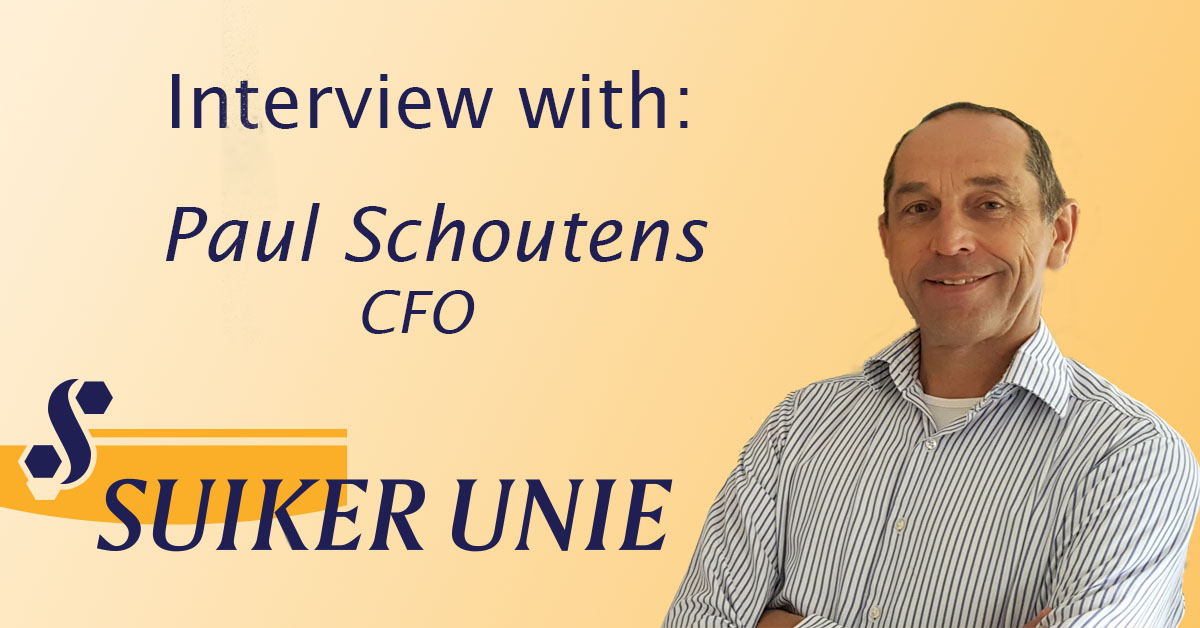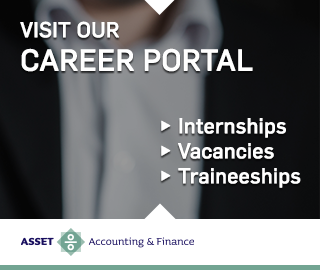Everybody knows that sugar is a vital ingredient in practically every diet. But what is the story behind one of the largest sugar manufacturers in Europe. And what is it like to be CFO of this manufacturer? We talk to Paul Schoutens, CFO of Suiker Unie.
Can you tell us something about your background?
Like many of you, I studied Business Economics at Tilburg University. During the final months before graduating university, I was offered the opportunity to do my final project at food producer LiGA. Here I was tasked to make an analysis of the multiple production-information streams, and configure a cohesive unit. Subsequently, I started working for the Central Body of Rates Healthcare in Utrecht. Based on the activities a hospital was performing we had to set budgets and determine the rates they could charge the insurance companies. Back then, I had about 25 general hospitals under my management. However, I didn’t have many career opportunities within this position, so I didn’t have to think twice when I saw a job offered by Suiker Unie as Information Analyst. IT systems became increasingly important in those days (beginning of the 90’s), and it became clear computer systems would be a vital part of the organization. Since most of these technologies were still in their infancy, as an information analyst, I had a lot of space to automate and optimize processes. I have been CFO of Suiker Unie since 2000. In this position I am responsible for the finances, automation of processes and IT within the company. I gained some management experience, and this position offered a great opportunity and substantial responsibility.
What are some concrete tasks you carry out as CFO?
Most importantly, accounting has to operate on point. Debtors, creditors, declarations, payments, etc. In addition, we are continuously looking for opportunities to integrate and optimize processes. Of course, we have our employees for that, but in the end, I am responsible for the results. Suiker Unie runs a campaign operation, which means we have to produce as much quality sugar from the available beets as possible in the period September-January. This requires some production planning, but our ERP system assists us very well with that. Furthermore, I am involved in the reporting of the business operation. This varies from constructing budgets to the yearly constructing of the three-year-operating plan. Throughout the year we determine whether everything is performing according to plan, and what we have realized until then. Lastly, I am working a lot with the Controlling department. We have access to a couple controllers who function as business partners, and assist us with several subjects related to commercial-, production- and agricultural matters. Whenever we decide on a certain investment, we consult with these partners whether it’s viable or not.
”Last October, the quotas for sugar producers was lifted. This decision was of huge influence on the market.”
Moreover, we are looking a lot at the future. In teams we work on various business cases with a long time horizon. Multiple future scenarios are assessed: ‘Which projects are worth an investment? What will be the management of the future?’. As a member of the board I am heavily involved in constructing the future of the company. Among other things, the strategy and future vision are often discussed. Last October, the quotas for sugar producers was lifted. This decision was of huge influence on the market. All of a sudden, we are dealing with a market production increase of 20%, coupled with a large competition and higher dynamism on the market. Currently, we are working on a strategy for 2020/2025 which works nicely in the different environment. It is up to us to respond to this change efficiently and retain or even improve our position. We are operating smoothly at the moment, but the competition is looming. As CFO, you are involved in every part of the business, and that makes the job fun.
What has changed in your time as CFO?
In the 18 years I have been CFO of Suiker Unie a lot has changed. For instance, in 2007 we bought the sugar division of competitor CSM, and in 2009 we took over the German sugar producer Anklam. Especially the acquisition of the CSM’s sugar division was extensive, as it was our only competitor in the Netherlands. The acquisition was thoroughly investigated by the Netherlands Competition Authority (NMa), to determine whether if it was acceptable. Ultimately, the acquisition received a green light, because the main competition in the market is on the European level. The integration of the new division went well in general, since there were a lot of similarities. We tried to achieve as much synergy as possible by integrating CSM’s processes in our systems. Naturally, some unpleasant matters were part of the acquisition, like the closing of some departments. Luckily, we managed to organize this in a very social manner.
”We have the largest factories in Europe on average, which has resulted in an excellent competitive advantage.”
In addition, as I touched upon briefly previously, the removal of the quotas for sugar production, which has a major influence on us. I am of the opinion that we anticipated this change well. For example, we expanded our producing capabilities of our factories in Groningen and Dinteloord. Like I said earlier, we are a running a campaign operation, which means we have to maximize production of quality products in a small-time window to lower our marginal costs. An expansion as such is quite an investment, so we have utilize our increased capability. Because of our great preparation we had the optimal starting point at the moment of removal. We have the largest factories in Europe on average, which has resulted in an excellent competitive advantage. We are conducting business in a market with a homogeneous product, so marginal costs are the key.
Are calls for a healthier lifestyle a threat for Suiker Unie?
Of course, the promoting of pursuing a healthier lifestyle has an influence on a company like Suiker Unie. We are of the opinion that sugar is a purely natural product that fits in a healthy diet. However, as is applicable to most products, too much is never healthy. Sugar provides us with energy, and makes products taste better. That is our vision, but it requires some restrain by the public. Unfortunately, the current trend describes the problem differently. We think that these descriptions lack nuance. For instance, the increase in obesity figures are supposedly caused by increasing sugar consumption, while research has proven that sugar consumption per capita has slightly decreased over the past decade. Of course, Suiker Unie has to take the rise of sugar free products into account. On the other hand, the world is experiencing a large increase in population, which translates into an increase in demand.
Do you have any tips for students that aspire to become CFO?
I have noticed that a lot of students are too occupied with planning their career. For example, they want to promote to another job title within a short period of time. I believe that excellent performance should have the priority of every young employee, the rest will follow. Coupled with a good attitude and a willingness to learn, you will be noticed by your employer. Don’t try to plan your career too much. Keep on proving yourself by working hard. Together with a diploma, everything will work out!
















